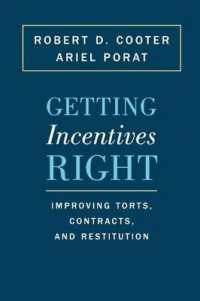Full Description
This book builds upon the self-study of teacher education practices (S-STEP) literature, research in teacher education, and perspectives on criticality and social justice. It explores critical self-study of teacher education practices as the systematic investigation of professional practice for self-improvement and the advancement of social justice by resisting inequitable systems, practices, and deficit-based ideologies. The volume provides readers with a conceptual and practical guide on the research of practice as connected with, and part of, social justice movements and equity efforts. Its major contribution is the articulation of 3 guiding commitments, or principles, that undergird critical self-study research: The first is engaging with critical consciousness; followed by enabling equity through methodology; and the final one is enacting advocacy. The text attends to ways researchers can employ critical self-study to conceptualize, investigate, and report their practices and situate issues of power, privilege, and oppression. A distinct feature of the book is the articulation of equity-based considerations for the development, deployment, and dissemination of a critical self-study. Guiding prompts, exercises, and suggested readings are provided to support readers of the volume in designing their own critical self-studies.
Self-study researchers, critical pedagogues and researchers, and scholar-practitioners will benefit from the unification of critical inquiry and criticality with self-study research. This volume invites self-study researchers to engage in critical explorations, and critical researchers to engage with self-study methods.
Contents
Part I. Critical Self-Study and Committing to Engage with Critical Consciousness.- Chapter 1. Introduction: Committing to Social Justice through Critical Self-Study of Teacher Education Practices.- Chapter 2. Critical Consciousness and Critical Self-Study: Centering Equity in Thought and Inquiry.- Chapter 3. Positionality in Critical Self-Study Research: Knowing Oneself to Ally With Others.- Part II. Critical Self-Study and Committing to Enable Equity Through Methodology.- Chapter 4. Critical-Study Methodology: Ontology, Theoretical Frameworks, and Conceptual Lens as Enabling Elements.- Chapter 5. Critical Self-Study in the Postmodern and Posthuman World:Considerations for Methodological Deployment.- Chapter 6. Critical Self-Study Research Findings: Enabling Equity through the Appraisal of Professional Practice.- Chapter 7. Critical Self-Study Research Recommendations: Equity-oriented implications for pedagogy, research, professional activities, and activism.- Part III. Committing to Enact Advocacy for Equity through Critical Self-Study.- Chapter 8. Critical Friendships and Trustworthiness in Critical Self-Study: Strategic Resistance and Persistence through Working with Others.- Chapter 9. The emergence of professional identity and equity-centered pedagogy: A critical self-study of teacher education practices.- Chapter 10. In Conclusion (But This is not the End): The Future of Critical Self-Study in the Face of Socio-political-ecological Precariousness.








